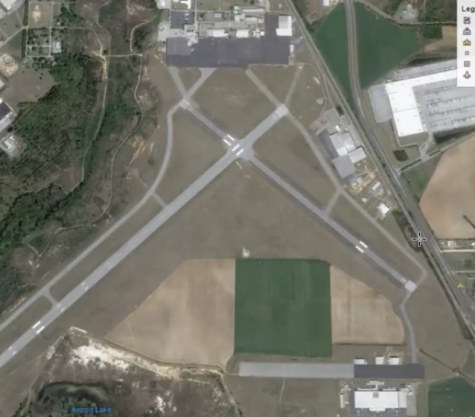Section Branding
Header Content
Commercial Jets Parked Due To Covid-19 Will Help Fund Airport Improvements In Macon
Primary Content
More than a dozen Delta Connection airplanes are riding out the COVID-19 pandemic at the Middle Georgia Regional Airport.
Monthly rental income of $960 per airplane will help offset costs to upgrade the airport’s secondary runway in the coming months.
“When we do the extension of the main runway, the secondary runway will be what keeps the airport open while the main runway is under construction,” Mayor Robert Reichert said during Tuesday’s meeting that approved funding for the project. “It will become the primary runway for a period of time.”
The 5000-foot-crosswind runway is long enough for Contour Airlines to continue its flights during the future main runway extension.
The federally-subsidized flights continue during the pandemic but sometimes with just one or two passengers, interim airport manager Blake Roy told the commission.
“Contour Airlines is still operating their normal schedule. They haven’t cut back any flights,” Roy said.
Based on conversations the airline has had with the U.S. Transportation Department, Contour is expected to keep flying, he said.
The airport’s current runways are sufficient for Contour’s smaller planes, but the county has been working for years to lengthen the main runway to accommodate much larger planes.
An environmental study of the land has been completed for extending the primary runway from 6,000 feet to about 8,000 feet.
Earlier this year, Macon-Bibb County Industrial Authority Vice Chairman Dwight Jones lobbied the Georgia Department of Transportation, or GDOT, and the local state legislative delegation to secure $3 million dollars in Georgia’s FY 20 Supplemental Budget for the work on the secondary runway.
“Our local delegation really is the ones who did the heavy lift,” Jones said in response to the mayor’s praise for his effort to lobby for the project.
GDOT will pay three-quarters of the cost of the estimated $4 million dollar rehabilitation and the county is responsible for the additional $1 million plus between $220,000 and $250,000 for design costs. Depending on the bids, the airport might have enough money remaining to spruce up taxiways, as well.
Rent collected from the parked jets and the airport’s regular tenants including Stevens Aerospace, Embraer, Robins North and Dean Baldwin facilities goes into an airport fund held in trust by the Industrial Authority.
Because the state funds are in the supplemental budget, a contract must be in place by June 30, Reichert said.
The Industrial Authority has agreed to float up to $1.25 million dollars for the county’s portion of the widening, repair and design work.
The authority will pay back those funds and any interest with future airport rent payments, under the agreement passed by commissioners this week.
Prior to the pandemic, business was booming at airport properties as Dean Baldwin Painting was about to begin construction of a $21.45 million aircraft strip and paint services facility for military and commercial aircraft. Robins North also was up and running with Robins Air Force Base’s 402nd Commodities Maintenance Group and a partnership with Central Georgia Technical College’s aviation program.
As the airline industry has taken a massive economic hit under extensive travel bans, Jones gave commissioners an update on airport tenants in Tuesday’s meeting.
“I apologize that this is not the rosy picture I’ve been fortunate to give you the last several years but it’s not horrible at this point,” Jones said.
Dean Baldwin’s site has been graded but the company will defer construction of some of the hangars by four to six months.
“Obviously, this was a big hit for them,” Jones said. “They’re still committed to the project but she’s moving cautiously and we feel that’s appropriate.”
Embraer, the world’s third-largest aircraft manufacturer, brought more than 100 jobs to its 155,000-square-foot facility in 2018, but suffered a $280 million loss last quarter and recently suspended operations.
“The leadership is upbeat,” Jones said. “They feel like this is a bump in the road and they are excited about their location.”
More than a month ago, the authority worked closely with Embraer hoping to lure at least 100 computer planes to park during the pandemic, but with the operation shut down no more planes are expected.
Stevens Aerospace and Defense Systems was in “startup” mode when they took possession of the property in 2018, Jones said.
“They’re still open but obviously they are not doing as much work as they were previous to the COVID-19 crisis,” he said.
Commissioners also approved spending more than $3,800 from the airport fund to match $123,493.36 in federal funds and $2,695.57 in state funding to purchase and install a new airport beacon.
The airport’s beacon dating back to the 70s went out of service in October and parts are no longer available.



